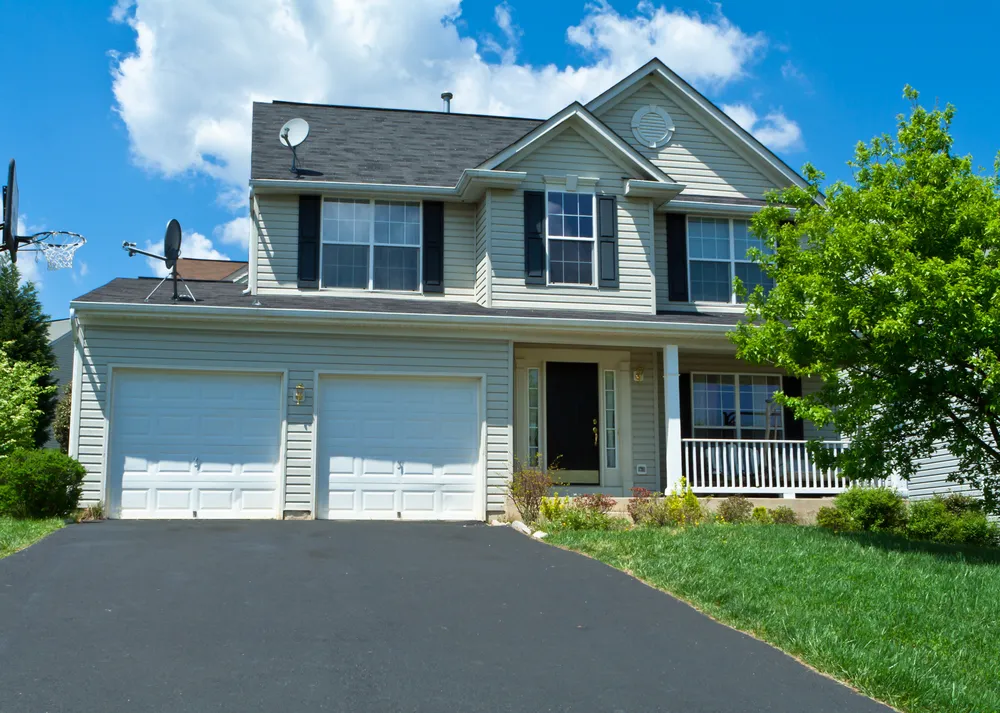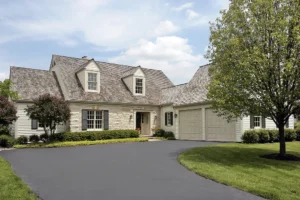If you want to enhance the appearance of your home and protect your driveway from damage, then sealing your blacktop driveway is a must. With prices ranging from $110 to $1,500, depending on factors such as size and type of sealant or coating, the investment is well worth it.
By reading on, you’ll discover how sealing your driveway can add value to your property and protect your pavement from wear and tear, ultimately saving you money in the long run. Don’t wait any longer to take care of your home’s exterior – keep reading to learn more.
Why Seal a Blacktop Driveway?
Paving your driveway is an important part of keeping it in good shape. But over time, the surface can start to deteriorate and that’s where driveway sealing comes in. Driveway sealing is the process of applying a sealant to the surface for protection and longevity.
Having a properly sealed driveway means not only prolonging the life of your pavement but also protecting it from outside elements such as sun damage and snow.
This will help keep the integrity of the material intact while enhancing its curb appeal at the same time. It’s important to consider various aspects when looking into this option before making a final decision in order to weigh out whether or not it’s right for you and your budget.
Factors Affecting the Cost of Seal Coating
The dimensions of the driveway.
The size of your driveway is an important factor to consider when it comes to having it sealed. Most contractors charge for the job by the square foot and you can expect to pay between $1.25 and $1.50 per square foot for materials and labor. If your driveway measures only a few hundred feet, then you may end up paying more as many contractors have a minimum fee for projects like this.
If you’re looking to expand your parking space, then it’s worth noting that the cost of paving a parking lot averages around $75,000 depending on the size required.
Of course, there are likely to be other additional costs associated with such a large project such as site preparation, excavation work, and installation fees which need to be taken into account too. All in all, it’s best to estimate at least double the cost quoted if you’d like an exact idea of what a parking lot paving job will set you back.
Sealant type.
The type of sealant you choose is essential when it comes to its cost per square foot. You can find many different types in 5- or 55-gallon units, which provide 500 and up to 5,000 square feet of coverage respectively. The amount of coverage a particular sealant provides will depend on how thick or gooey the sealer is; generally, the thicker the sealer, the less it covers, but with a more durable finish. This means that in order to get maximum coverage for the best price, it’s important to find a balance between the mobility and consistency of your chosen sealant.
Sealants come in many different materials such as acrylics, epoxies, and polyurethanes; each one has its own unique characteristics such as resistance to UV rays or grease repellents.
It’s worth weighing up all these options before making a decision so you can get the most out of your purchase while ensuring long-lasting durability.
There are also specialist sealants available specifically designed for particular surfaces such as concrete or metal roofs so make sure you know what you need before investing in something that won’t be suitable for your application.
Do you need another seal coated?
For any homeowner, it is important to consider how to best protect and beautify their home. One of the most cost-effective ways of achieving this goal is by resealing areas such as driveways, concrete pathways, and patios.
Resealing these surfaces helps to ensure they resist water damage and retain their vibrant colors while also repelling toxins, dirt, and other substances that can degrade them over time.
Fortunately, many contractors offer resealing services at a minimum fee that gives homeowners great value for money.
Of course, if the area needing attention happens to be quite small – such as a single driveway – then there may be cost savings associated with sealing other areas at the same time in order to meet the contractor’s minimum fee.
This not only ensures that driveways, pathways, and patios are all adequately protected from environmental damage but also gets you better value for your money overall.
How many coats do you want?
Applying one coat of sealant to a driveway might seem like the most cost-effective approach, but for those with heavier vehicles or lots of regular traffic, it’s worth asking your contractor to add an additional coat.
This extra layer will provide added protection against wear, weather, and ground movement that can damage asphalt driveways over time.
And while the cost of sealing your driveway will certainly increase with two coats, it won’t double as much of the time-consuming work, such as cleaning and prepping the surface, was already done during the first phase.
Two coats are necessary in certain cases where more protection is needed. If you live in a place prone to cold winter temperatures or heavy summer rains – both of which can take a toll on asphalt driveways – then an additional layer of sealant should be considered.
The second layer helps repel water and keep out dirt and grime; this not only prolongs the life of your driveway but also keeps it looking fresher longer.
Plus, if your home gets visitors in cars or trucks daily, proper sealing is essential for ensuring those vehicles remain a safe distance from any potential damage and wear on the surface below.
Is your blacktop driveway badly damaged?
If you’ve been putting off resealing your driveway, chances are it has suffered damage like spiderweb cracks, pitting, craze cracks, or small holes. Fortunately, there are options available to address the damage.
A top coat will help extend the life of your asphalt driveway by at least 10 years, provided that it does not suffer from too much damage. Latex acrylic is a thicker and more durable sealant that can fix more serious issues.
The cost of this option is lower than having a brand-new driveway installed; however, it won’t suffice for more extensive damages such as fill-and-seal. Fill-and-seal is the most costly option for repairing damaged asphalt driveways but often yields the best results if extreme care is taken in the application.
Do you want to take your blacktop to next level?
Enhancing the look of your driveway can go a long way in boosting your home’s curb appeal. You can ask your contractor for an upgrade beyond just resealing it, with options like getting a design stamped into the sealcoat or even having it colored for something fun and unique.
Maybe you’d prefer to add some elements of elegance, such as pavers around the perimeter. Be aware that any additional services will cost more than just a standard sealcoat application, but it can definitely make all the difference in giving your property an instant boost in style.
When considering ways to enhance your property’s style, remember that revamping your driveway is one of them. A simple change can have a big impact on how others view your home and its surroundings.
If you’re interested in exploring further customization opportunities beyond a standard sealcoat, speak to your contractor and see what they suggest – be it a custom design or color scheme or incorporating pavers that give off an elegant vibe.
Make sure to know upfront what kind of investment you might be making, as fancier finishes won’t come free, but if done properly could provide excellent returns when it comes to admiration from passersby.
Average Costs for Seal Coating
Having a nice, sealed driveway adds to your property value and helps protect your pavement from the elements.
The cost of having your driveway sealed will depend on several factors including the size, type of sealant, and type of coating that you choose.
On average, sealing an asphalt driveway costs around $470 although prices can range from as low as $110 at the lower end up to as much as $1,500 at the top end.
The cost of sealing a driveway depends largely on its size since larger driveways require more materials and labor. Additionally, factors like what type of asphalt sealer or coating you’ll use also play a role in the final price.
You can choose between standard oil-based pavement sealers that last a few years or acrylic polymers that create an armor-like coating with lasting protection against harsh weather conditions and staining.
Ultimately, regardless of what materials you decide to use having your asphalt driveway sealed is worth investing in – it not only enhances curbside appeal but also keeps your pavement safe from wear and tears over time.
When is the best time to seal a driveway?
When it comes to maintaining the integrity of a driveway, sealing is an essential task. Not only does it help your driveway look more attractive, but more importantly it seals out water and prevents cracks from forming due to weathering.
It’s important to note that new driveways shouldn’t be sealed before they are at least 6 months old because the sealant will not properly bond to the surface otherwise.
The best time to seal a driveway is between spring and fall when the temperature is above 55 degrees and there is no rain in the forecast for 24 hours after the sealant is applied.
This allows enough time for the sealant to dry properly so that it can form a durable waterproof barrier against water and debris. Sealing during extreme temperatures can cause cracking or bubbling that may ruin your efforts in paving the perfect driveway.
Always remember to read any instructions related to temperature on product labels before attempting any work on your driveway.
DIY vs. Professional Seal Coating
When it comes to sealcoating a driveway or other asphalt surface, there are advantages to doing it yourself. The biggest benefit is that you don’t have to pay labor fees—you can save money by completing the task on your own.
Additionally, because you’re in charge of the entire process, you can make sure that the work meets your standards and that you use quality materials. It’s also a great opportunity for bonding with family members or neighbors who come together to help out with the job.
However, there are some risks associated with DIY sealcoating. Completing this type of project correctly requires certain skills and specialized equipment.
If done incorrectly, chances are that the sealcoat won’t last long and eventually crack or peel off. As a result, it would be necessary to hire a professional contractor at an extra cost down the line.
It is important to evaluate whether this kind of project is within your ability level in order to avoid any unnecessary problems later on.
Conclusion
Sealing your blacktop driveway is an investment that pays off in both curb appeal and pavement protection. While the cost of sealing a driveway can vary based on several factors, including size and type of sealant or coating, the benefits are clear.
Whether you opt for a standard oil-based sealer or a long-lasting acrylic polymer coating, taking care of your driveway will help maintain your home’s value and save you money in the long run. So don’t hesitate – to choose the best materials for your needs and start enjoying the benefits of a beautiful, protected driveway today.


